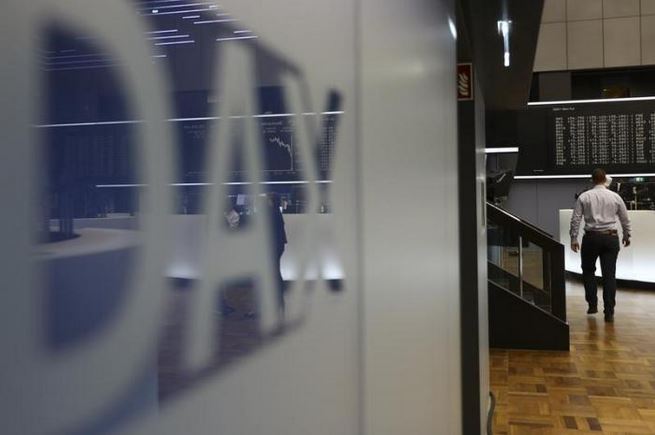
The German stock market index DAX is reflected in a logo at the Frankfurt stock exchange in Frankfurt Germany, October 14, 2016. REUTERS/Kai Pfaffenbach
Stocks fell on Friday, curbed by the continued surge in global bond yields, while the dollar hit a three-month high against the yen as investors grew more confident that the Federal Reserve will raise U.S. interest rates by the end of the year.
Benchmark 10-year U.S. and euro zone yields rose to their highest since May and 10-year British yields were firmly on track for their biggest monthly rise since January 2009, the second biggest in over 20 years.
Investors’ focus turns to third quarter U.S. gross domestic product figures later on Friday after upbeat jobless claims, manufacturing and home sales data on Thursday strengthened the case for the Fed to raise rates by the year-end. [ECONUS]
“Bond markets are facing a recurring nightmare at the moment as we continue to see yields rise sharply,” said John Reid, a market strategist at Deutsche Bank.
Analysts at Rabobank deemed the bond market sell-off a “bloodbath”, although questioned whether the economic fundamentals justified such a steep rise in yields.
Europe’s index of leading 300 shares .FTEU3 was down 1 percent in early trade at 1,337 points, Germany’s DAX was down 1 percent .GDAXI and Britain’s FTSE 100 was down 0.6 percent .FTSE100.
MSCI’s global stock index was down 0.2 percent .MIWD00000PUS, the fourth consecutive down day marking a losing streak not seen for two months.
MSCI’s broadest index of Asia-Pacific shares outside Japan .MIAPJ0000PUS was down 0.3 percent, pressured by the prospect of easy money flows being crimped should the Fed tighten policy soon.
The one bright spot in Asia was Japan, where the weak yen helped lift the Nikkei 225 index .N225 by 0.6 percent for a weekly rise of 1.5 percent.
The Fed, Bank of Japan and Bank of England all deliver their latest policy decisions next week. The Fed is 90 percent certain to hold its fire, according to fed fund futures pricing on the Chicago Mercantile Exchange. But the probability of a rise in December, after the U.S. presidential election, is 72 percent.
HIGHER AND HIGHER
In a week marked by deep slides in prices of U.S. and European debt, the benchmark 10-year Treasury yield US10YT=RR climbed to a five-month high on Friday just under 1.88 percent, helped along by the surging British Gilt and German bund yields.
A sell-off in gilts had led the way on Thursday as strong third quarter U.K. growth data doused expectations for monetary easing by the Bank of England.
The 10-year Gilt yield GB10YT=TWEB has risen nearly 20 basis points this week to levels not seen since Britain’s vote in June to leave the European Union. The 10-year yield has risen more than 50 basis points this month.
Germany’s 10-year bund yield DE10YT=TWEB rose to 0.219 percent, its highest since early May, and marking a sharp turnaround from the record low minus 0.20 percent in July under the European Central Bank’s extensive monetary easing.
But along with U.S. and UK yields, they have recently risen amid concerns that ultra-easy policies practiced by the major central banks could have their limits and may not be continued indefinitely.
Boosted by the spike in Treasury yields, the dollar scaled a three-month peak of 105.42 yen JPY=.
“105 (yen) was both a psychological and technical point, and it broke ahead of U.S. GDP later today,” said Kaneo Ogino, director at foreign exchange research firm Global-info Co in Tokyo.
“Some people did not want to be short ahead of that, also with the Bank of Japan and Fed meetings next week, and U.S. non-farm payrolls data one week from today.”
The rise in euro zone bond yields boosted the euro’s appeal and lifted the single currency by a quarter of one percent to $1.0924 EUR= on Friday.
The dollar index .DXY was little changed at 98.880 after rising about 0.2 percent on Thursday. It was on track to gain about 0.3 percent this week, having struck a nine-month peak along the way.
In commodities, crude oil gave back some of Thursday’s gains. Brent crude LCOc1 was down 0.3 percent at $50.33 a barrel and U.S. crude was down 0.4 percent at $49.50 CLc1.

